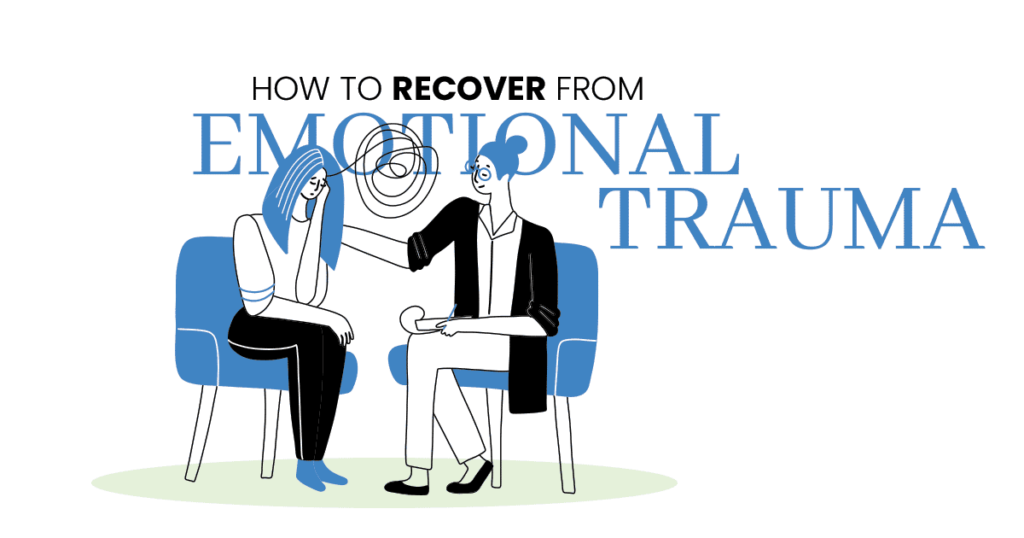Recalling memories can bring up certain emotions. Some of these emotions are positive, such as happiness, love, and satisfaction. However, some memories may trigger negative emotions, such as anger, sadness, or shame.
Whenever someone goes through a traumatic experience, it’s difficult to get over the emotional pain caused by the memory of that event. It could be the death of a loved one, a physical or sexual assault, a natural disaster, or any other type of traumatic incident.
People try to cope with the emotional suffering induced by trauma in a variety of ways. For example, some individuals dismiss their memories and act as if they never happened. Others may keep the memories tucked down in their heads and never speak about them.
Meanwhile, some people may seek to ease their misery by self-harming or misusing drugs or alcohol. These coping techniques can be extremely detrimental and make it more difficult for a person to heal.
You can, however, recover from emotional trauma in several ways.
But First, What Is Emotional Trauma?
Emotional trauma results from events or experiences that leave us feeling overwhelmed and out of control. Traumatic events can be anything from a natural disaster to a personal assault.
This trauma can be a recognizable persistent sense of unsafety and vulnerability. It disrupts our physical and emotional equilibrium, leading to symptoms like flashbacks, intrusive thoughts, nightmares, somatic complaints, and avoidance behaviors. However, recovery from emotional trauma is possible with the right tools.
How Long Does It Take To Recover From Emotional Trauma?
Recovering from emotional trauma usually lasts up to a few months, depending on the severity of the incident, until it gradually fades as you process the event. The most important thing is to be patient and allow yourself time to heal. Don’t force the process, or bottle up your feelings—that will only prolong the healing process.
However, if the trauma symptoms do not ease up or get worse, and you find yourself unable to move on from a prolonged period, you might have post-traumatic stress disorder (PTSD). While emotional trauma is a normal response, it can progress to PTSD when it interferes with your daily life. In this case, you should see a mental health professional for help.
Tips on How To Recover From Emotional Trauma
While emotional trauma can be incredibly damaging, it is possible to heal with the right help and support. Follow these tips to help you cope with and recover from emotional trauma:
Talk About Your Experience
Emotional trauma can make you want to isolate yourself and deal with your feelings alone. However, this can make the healing process much longer and more difficult. Talking openly and honestly about what you’ve been through can be very therapeutic. It can also help you process the experience and start moving on.
There is no need to go into detail or share everything with just anyone—find someone you trust, like a friend, family member, therapist, or support group, and tell them about what you’re going through.
Embrace Your Emotions
It’s normal to feel a range of emotions after experiencing emotional trauma. However, denying or suppressing these feelings can prolong the healing process. Instead, acknowledge your emotions and allow yourself to feel them, even if they are difficult to deal with. This may be hard at first, but it is an important step on the road to recovery.
Seek Professional Help
If you’re struggling to cope with emotional trauma on your own, it may be helpful to seek professional help. A therapist can provide you with support and guidance as you work through your feelings.
Moreover, they can offer coping mechanisms and strategies to help you manage your trauma. These may include talk therapy, cognitive-behavioral therapy (CBT), or Eye Movement Desensitization and Reprocessing (EMDR).
Exercise Regularly
Exercise has been shown to be beneficial for mental health, and it can be especially helpful in recovering from emotional trauma. Exercising releases endorphins, which help improve your mood and make you feel better overall.
In fact, one study has found that exercising weekly leads to a significant decrease in PTSD symptoms and depression. Aside from that, the respondents have experienced better sleep quality after the program ended.
Eat a Healthy Diet
Having a balanced diet is essential for both your physical and mental health because it provides your body with the nutrients it needs to heal from emotional trauma. To give you a mood boost, avoid having sugary and fried foods in your meal and eat plenty of omega-3 fats, such as tuna, salmon, flaxseeds, walnuts, or soybeans.
Take Care of Yourself
Self-care is a priority in overcoming emotional trauma. Besides eating well and exercising, you can take care of yourself in other ways, like getting plenty of rest, avoiding alcohol and drugs, and finding time for activities that bring you joy.
Seek Support From Loved Ones
Connecting with your loved ones does not always involve talking about the trauma. This is because sharing the experience can cause you to relive the trauma, which can trigger painful emotions and memories.
If you find that talking about the experience makes you feel worse, there are other ways to connect with your loved ones. For example, you can spend quality time together or ask for their help for practical things like babysitting, grocery shopping, or taking care of your pets.
Don’t Blame Yourself
Blaming yourself for what happened will only hinder your healing process. Always remember that you are not responsible for the emotional trauma you experienced. It was not your fault, and you can’t change what happened.
Give Yourself Time to Heal
Healing from emotional trauma takes time. There is no set timeline, and what works for one person might not work for another. Be patient and allow yourself to grieve the loss you’ve experienced.
Getting Help for Trauma in San Diego
Experiencing emotional trauma at any age can be a very difficult and life-changing event. It’s important to know that there is hope for recovery and that you’re not alone in this process. By seeking professional help, engaging in self-care, and reaching out to loved ones, you can begin the healing process and regain your sense of self.
To learn more about treatment options for treating trauma in San Diego, contact the Mental Health Center of San Diego at (858) 258-9883.















